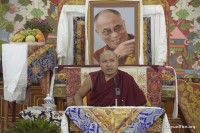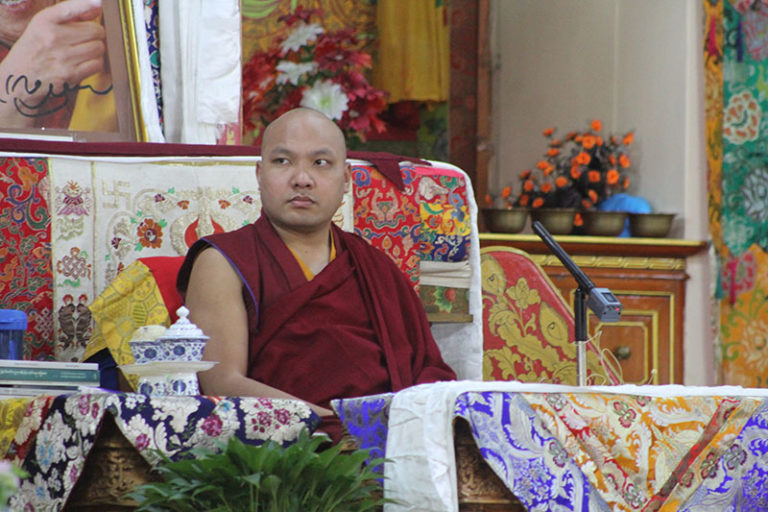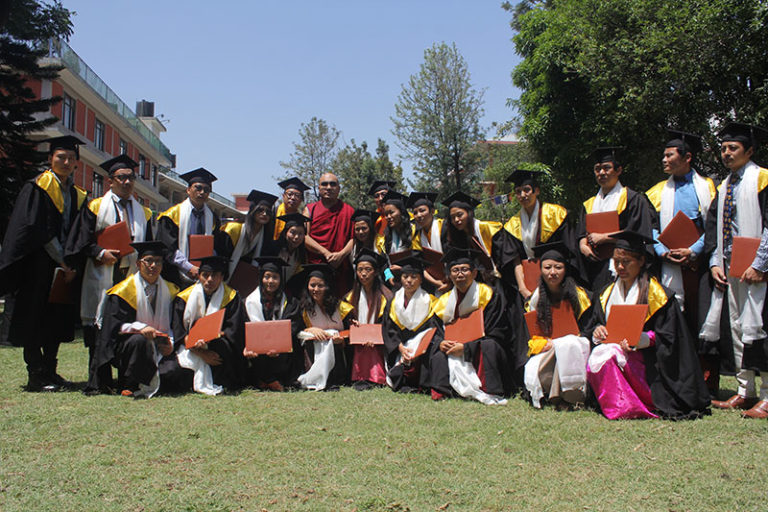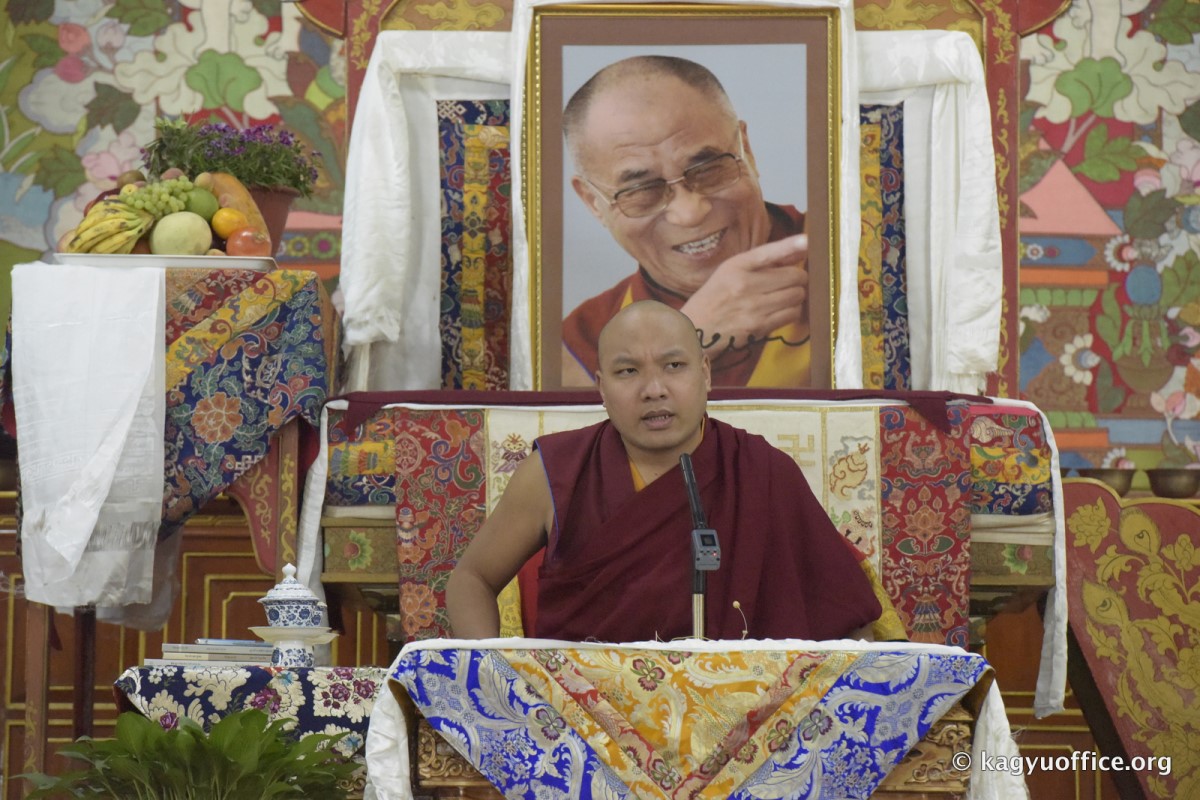法王新闻 | 2017年04月
薩惹哈學院畢業典禮中,呼籲保存西藏文化
Rings an Alarm: We Must Preserve Tibetan Language and Culture
སཱ་ར་མཐོ་སློབ་ཏུ་རིགས་སློབ་མ་ལག་གཉིས་ཀྱི་བསླབ་པ་མཐར་སོན་གྱི་མཛད་སྒོ།

時間:2017年4月30日 April 30, 2017
地點:印度 喜馬偕爾邦 達蘭莎拉 Sarah College, Dharamshala, Kangra, HP, India
The Gyalwang Karmapa’s car passed by ordained and lay students who stood along the tree-lined road leading to Sarah College. After a brief visit to the college office, he was invited into the main hall where he was offered a mandala and the three representations of body, speech, and mind.
抵達薩惹哈學院時,法王受到該校僧俗二眾學生的夾道歡迎。在學院的辦公室短暫停留後,法王受邀進入會場,接受與會代表的曼達獻供及身、語、意供養。
As the Chief Guest, the Karmapa had come to confer, along with Kalon Karma Gelek Yuthok, certificates to the Lobpon graduating students, the Uma Rabjampa and the Parchin Rabjampa students from Institute of Buddhist Dialectics, which shared this convocation ceremony with Sarah College.
法王並協同藏人行政中央宗教與文化部部長噶瑪.噶勒.祐兜(Karma Gelek Yuthok),為薩惹哈學院的畢業生頒發阿闍黎證書,並且為佛教辯證學院的畢業生頒發佛學學士(Pharchin Rabjampa)和碩士(Uma Rabjampa)證書。
Welcoming everyone, the Karmapa noted that he’d had quite a bit of experience attending functions at universities, both in India and abroad, yet he felt a special connection with Sarah College that made him especially happy to participate in this ceremony.
在問候會眾後,法王首先表示,無論是在印度或海外,對於出席大學裡的活動,他已相當有經驗。但他感覺自己與薩惹哈學院特別有緣,因此出席今天的典禮尤其讓他感到高興。
For special greetings, the Karmapa singled out the students who had studied the major texts of all the four main traditions in Tibet, and he also gave a special greetings to the lay women who had completed their studies for Uma Rabjampa and Parchin Rabjampa: “Carrying out a policy of not differentiating between the ordained and lay Sangha,” the Karmapa observed, “Sarah College has opened the opportunity for everyone to study Dharma, including lay women. It is excellent that all women can now study the major texts.”
法王還特別提到學院中學習四大教派典籍的學生,尤其是完成佛學學士和碩士學位的女眾畢業生:「薩惹哈學院秉持僧俗就學平等的方針,讓每個人都有機會學習佛法,其中也包括女眾居士。現在所有女眾都可以研習主要佛典,這點非常好。」
Turning to the study of the Tibetan language itself, the Karmapa stated, “It is the very root of everything.” “If we look at the texts from Dung Huang,” he continued, “we will see two types of language. One comes from the Buddhist sutras and treatises and the other from historical documents, communications, and correspondence of that particular time. In the traditional Buddhist texts, the style, grammar, and way of expression are quite similar to what we see today. However, the language of the historical documents, official communications, and letters have undergone change and exhibit a different style, grammar, and ways of expression.”
在談到學習藏文時,法王指出:「藏文是一切的基礎。如果去看敦煌的藏文文獻的話,我們會發現裡面有兩種藏文:一種是出自佛經、佛教論典的書寫式藏文,另一種是出自當時的歷史性文獻、通訊和書信的口語式藏文。傳統佛教典籍中使用的藏文,它的風格、文法和語法,跟我們現在使用的藏文非常類似。然而,歷史性文獻、官方通訊和書信使用的藏文,它的風格、文法和語法就有不同的變化了。」
“There is a big gap between these two types of language,” he explained, “and the colloquial gives us the most difficulty when we come to study Tibetan. This is often the case with other languages as well. When I studied Korean, I was told ‘You write it like this, but you have to learn the colloquial differently.’ This divergence between literary and spoken languages is similar to Tibetan.
法王接著說明:「在這兩種藏文之間有一個差距。學藏文時,最難學的是口語式藏文,而這個問題並非藏文獨有,它也存在於其他的語言當中。例如,我學韓文時,有人告訴我:『你寫時要這麼寫,但講時就不同了。』韓文的這種書寫語和口語之間的分歧,就跟藏文類似。」
The pronunciation of colloquial Tibetan changed over time as letters became corrupted and left out. This situation makes it hard to discover what the actual pronunciation was. “For example, in the Tibetan language spoken in Eastern Tibet, we say ‘Tering mida katsu lep du?’ (‘How many people came today?’) What is unusual here is ‘mida’: mi clearly means ‘people,’ but why is the da there? It turns out that this is a corrupted form of rta (horse) since in the olden days, people (mi) always arrived on a horse (rta), so they were inseparable. Over the years, the pronunciation had shifted from ta to da. However, no matter what the pronunciation might be, you would always write it the same (mi rta).”
「口語式藏文的發音隨著時代而改變,因為有些字母被寫錯或被省略,所以難以找回真正的發音。例如,藏東講的藏語會說:『Tering mida katsu lep du?』(今天來了多少人?)這裡不尋常的字是mida。mi 的意思顯然是『人』,但為什麼還有個da 呢?原來da是藏文rta 『馬』 的誤寫。因為古時候的人總是騎著馬來的,所以人和馬是分不開的。隨著時間的推移,原本ta的發音就變成da了。然而,無論口語發音怎麼變,在寫這個字時,我們 仍然必須寫mi rta。」

The Karmapa then brought up Kadampa texts that contain the teachings of their masters. “They are written in the colloquial language of Central Tibet, so with these records, we can hear the actual pronunciation of a language that was probably widespread at the time.” The Karmapa also remarked, “When you are reading literary Tibetan, you do not pay much attention to the language. It just goes on by. But when you are reading colloquial, the feeling is different, and you naturally take an interest in what is being said.”
法王接著提到噶當派祖師開示的典籍:「這些是以中藏的口語式藏文所寫,我們或許可從中推測當時普遍的藏文發音。」法王還指出:「在讀書寫式的藏文時,你不用花太多注意力在語言上,你就是這麼讀過去。但在讀口語式藏文時,感覺就不一樣了,你自然會去想它在講什麼。」
“How can the great gap between written and colloquial languages be lessened?” the Karmapa asked. “Usually Tibetans who have gone to school still cannot read literary Tibetan. If you give them a treatise, or even a normal book to read, it’s not certain they could understand. On the other hand, if you give such texts in their own languages to an educated foreigner or Chinese, most of them would comprehend. For this reason it is essential to preserve our spoken and written Tibetan. Many people should reflect on this situation and do research.”
「書寫式和口語式語文之間的巨大差距,該如何彌補呢?一般上過學的藏人還是看不懂書寫式藏文。如果你給他們一部論典,甚至是一本普通的書,他們都不一定看得懂。然而,如果是上過學的外國人或華人,你給他們同樣內容的外文或中文讀物,大部分的人都能夠看得懂。因此,同時保存我們的書寫式和口語式藏文,這點極為重要。大家不妨在這方面多做探討,進行研究。」
The Karmapa observed that Sarah College has emphasized the study of Tibetan language and culture, so people with these interests have come here to study Tibetan Dharma, language, history, and the Buddhist sciences, such as grammar and poetry. “It seems, however,” the Karmapa continued, “That the way of thinking and behavior has changed somewhat. In general, devotion can move in two directions: if it goes off in error, it becomes blind faith; if it goes well, it becomes a deep, abiding faith.”
法王指出,薩惹哈學院向來重視西藏語言和文化的學習,許多對這方面有興趣的人,也會來此學習西藏的佛法、語言、歷史和佛教科學:「然而,大家的想法和行為似乎有所改變。一般而言,虔敬心可能有兩種演進的路徑:走偏的虔敬心就變成是盲信,沒走偏的虔敬心就會成為深刻和持久的信心。」
“Before there seemed to be a strong belief among the students,’ he observed, “but now one can see that their behavior has changed. It is difficult to say why and yet it is important that we pay attention to this.”
「以前的學生似乎有強烈的信念,但現在學生的行為好像已經改變了。箇中原因很難說,但重要的是我們要好好注意這點。」
Shifting to the topic of Tibet’s future, the Karmapa warned, “In Tibet, the numbers of those opposed to Dharma and to Tibetan cultural traditions are gradually increasing. On the one hand, this is happening all over the world, so it is not surprising. However, we Tibetans have arrived at a critical juncture, when it is of the utmost importance that all of us work together and keep our minds in harmony. Of course, people have their own way of thinking and philosophy, but if this leads to great social disturbances and entrenched opposition, the Tibetan society will be dismantled and destroyed.
在談到西藏的未來時,法王告誡:「在西藏境內,與佛法和西藏文化傳統對立的人逐漸增多。就某方面來說,這是全世界都在發生的事情,所以沒什麼好驚訝。但我們藏人已經走到了一個至關緊要的關頭,我們的所有人都必須共同合作,同心同德。當然了,每個人都有自己的想法和哲學,然而,如果這會導致社會擾動,並且加深對立的話,那麼西藏社會就會受到破壞。」
“It is perfectly all right to have our own view and position on things. These, however, are not about making a big impression on others; rather, we should seek out our commonalities. Since we live in a precarious time, it is crucial that we cooperate and keep our relations compatible. If you look from the outside, we seem to be a powerful people but within our society, there are clashing views and heated arguments based on the hardened positions we have taken. In such a situation, it will be difficult for Tibetans to ever rise up again.”
「個人有個人的見解和立場,這完全沒有問題。但這些不應該被拿來當成譁眾取寵的工具,我們反而應該去找到彼此的共同點。我們活在一個危殆不安的時代,因此,重要的是我們互相合作,關係和諧。從外面來看,我們似乎是一個強大的民族,但在我們社會的內部,卻因為各自採取的強硬立場,而有意見的衝突和激烈的爭執。於此情況下,藏族要再次興盛難矣。」
“There are different political positions,” the Karmapa observed, “diverse ways of holding cultural traditions, and a variety of religious traditions. On the one hand, these create a rich social fabric as well as fields for discussion and exchange of thought. However, it is a great mistake if we craft strategies and make plans based on our own particular ideas and for our own personal benefit. This will tear apart our social harmony.”
「我們有不同的政治立場,有不同執持文化傳統的方式,也有各種宗教傳統。就一方面來說,這些為我們的社會創造出不同的元素,以及彼此討論和交流的領域。然而,如果我們以一己之見、為了一己之私而制定策略和計劃的話,就會把我們社會的和諧破壞掉。」
Speaking of Tibetan customs, the Karmapa commented, “From one perspective, many of our customs could be seen as faulty. However, I do not think it would be a good idea to toss away all the old customs. Tibetans are a bit different from other people. They have a close connection to their customs and traditional ways of doing things, which are in turn deeply related to the philosophy and practice of Buddhism. If we were to eliminate them all, we would be left without our precious jewel, our beautiful ornament, bereft of something we could show to others.”
在談到西藏的風俗時,法王表示:「從某個角度來說,我們有許多可以說是訛誤的風俗。但我不認為把所有舊的風俗拋棄是好事。藏族跟其他民族有點不太一樣。藏族與自己的風俗習慣關係密切,這跟佛教的哲理和修持有深刻的關係。如果把所有的風俗都丟掉,我們就會連珍貴的珠寶、我們美麗的裝飾都沒了,再也拿不出什麼可向別人展示。」
“Previously we could not stand on our own two feet. Remembering this, we need to look at the culture we have inherited and treasure it. We should maintain it into the future while at the same time, staying in touch with our contemporary world and the discoveries of science. We should study what science has to say. On this basis, the Tibetan people’s heritage, for example the Dharma texts, can become more important and powerful than before. For this to happen, a mind imbued with Dharma and a stable sincerity are essential.”
「之前,我們無法靠自己的兩腿站立。現在,要記住,我們必須看顧自己繼承的文化,並且好好珍惜它。我們應該將它傳續至未來,並且保持與當代世界和科學發現的連繫。在這個基礎上,藏族所承續的傳統,例如佛教典籍,就會變得比以前更重要、更有力量。然而,要做到這點,我們必須有一顆受到佛法薰陶的心和堅定的誠意。」
The Karmapa then addressed another problem he saw in Tibetan society. “Sometimes the preoccupation with politics is too strong in our Tibetan world. People talk about it all the time. Instead, we should be discussing Dharma and our cultural and academic traditions. The Tibetans in Tibet have affection for one another, and you can find instances of true harmony between the three major cultural areas of Tibet. This is different from the situation of my youth when Eastern Tibetans were Eastern Tibetans and Central Tibetans were Central Tibetans and that was that. Tibetans in Tibet are starting to see that they are all the same, have the same flesh and blood and aspirations. They are not always talking and arguing about politics the way Tibetans in India do.”
接著,法王探討藏人社會中的另一個問題:「有時藏人社會對政治過於熱衷,我們反而應該多討論佛法、我們的文化和學術傳統。在西藏境內的藏人相親相愛,我們可以在西藏三大文化區中,找到真正和諧的例子。這跟我小時候的情況不同,以前藏東的藏人是藏東的藏人,中藏的藏人是中藏的藏人。現在西藏境內的藏人,開始看見彼此都是一樣的,彼此都有同樣的血肉和心願,他們不會像印度的藏人那樣,一直談論或爭論政治。」
The Karmapa then advised, “Whatever happens to us, we should face it directly. Up to now the Tibetans in Tibet have sustained their enthusiasm and not become discouraged. We should take them as a role model.” “The Tibetans who came in the beginning, he noted, “had a sincere, straightforward, and wholesome mind that was stable as well, but now people have become hypocritical and deceptive.”
法王勸告:「過去發生在我們身上的事,我們應該要直接面對。目前為止,境內藏人持續保有他們的熱忱,從來沒有氣餒。我們應該以他們為楷模。」法王指出:「最初來到這裡的藏人,性情真誠、直爽、穩健,但現在的藏人偽善又狡詐。」

The Karmapa cautioned, “At this critical stage in our history, we need to be very careful, especially since HH the Dalai Lama is moving up in his years, and the population of Tibetans in India is decreasing. Many want to go abroad. I’m told four or five thousand a year make the attempt, and though not all succeed, Tibetans have the aspiration to leave. On the other hand the number of people arriving from Tibet is decreasing.”
法王警誡:「在我們藏族歷史的關鍵性階段,我們必須非常小心謹慎。尤其達賴喇嘛尊者的年歲漸高,而印度內藏人的人口持續下降。許多人想去國外,有人告訴我,每年有四、五百人進行這樣的嘗試,雖然不見得都成功,但藏人確實有想要離開印度的願望。就另一方面來說,西藏來的藏人又持續在減少。」
The Karmapa concluded with a summary of his advice and a warning. “Tibetans need to be unified in a firm and stable bond. We need to be skillful in maintaining the continuity of our Tibetan Dharma, culture, and society. And we need a stable mind that is permeated by the Dharma. Without this, it will be difficult for us in the future.”
結語中,法王再次提醒:「藏人必須團結在堅定的情誼中,藏人必須善於延續我們的藏傳佛法、西藏文化和社會。我們必須有一顆受到佛法薰陶的心。如果缺乏這樣的心,我們的未來便會困難重重。」
At the end, the Karmapa ended with his congratulations to all those who completed their studies and a special greeting to Taklung Shabdrung Rinpoche, who received his Uma Rabjampa degree.
最後,法王祝賀所有的畢業生,並特別向獲頒佛學碩士學位的達隆夏祖法王(Taklung Shabdrung Rinpoche)致意。
